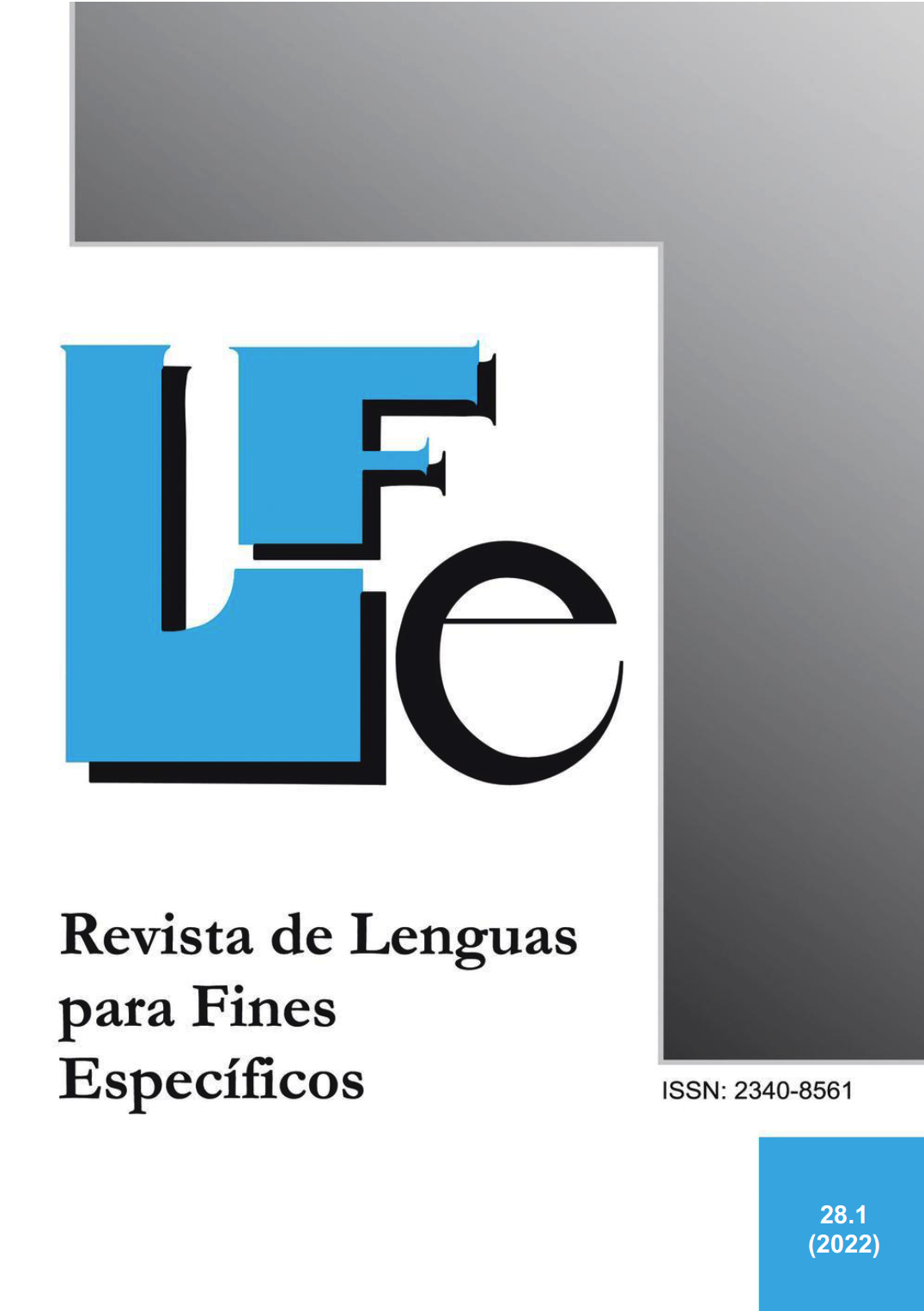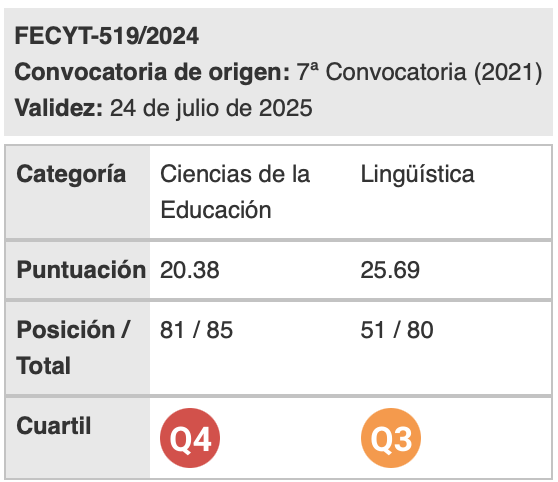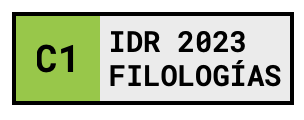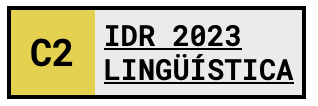Recurrent and not-so-recurrent pragmatic errors in academic writing in English as a Foreign Language
Keywords:
English as a Foreign Language, CEFR companion volume, pragmatic error, writing, learner corpusAbstract
In our globalised world, the need of a common language is encouraging the massive learning of English. Much effort has been dedicated to help improve proficiency at different levels of language learning, but, as students face greater levels of complexity, proficiency in pragmatic aspects of language continues being deficient (Romero-Trillo, 2002; Author and Carrió Pastor, 2013). This must be addressed in the Foreign Language (FL) classroom (Sperber and Wilson, 1995; Wang, 2007). In this regard, the Common European Framework of Reference for Languages (CEFR), grounded on the communicative approach, has provided guidelines to teach and established Foreign Language proficiency levels. The CEFR Companion Volume proposed more detailed descriptors to identify and outline language proficiency. The present paper displays a 10-year pseudo-longitudinal study of a learner corpus of 125 written texts produced by University students in which pragmatic (coherence and cohesion) errors are analysed. The aim of the study has been to examine improvement in student production in the years subsequent to the publication of the reference book. Results point to errors that have been minimised after training and instruction, but they also identify some recurrent errors in English as an FL writing.
Downloads
References
Ahmadi, A. & Parhizgar, S. (2017). Coherence Errors in Iranian EFL Learners' Writing: A Rhetorical Structure Theory Approach. Journal of Language Horizons, 1(1), 9-37.
Alcón Soler, E. & Martínez Flor, A. (2008). Pragmatics in Foreign Language Contexts. In Alcón Soler, E. and Martínez Flor, A. (Eds.) Investigating Pragmatics in Foreign Language Learning, Teaching and Testing: Bristol: Multilingual Matters.
Álvarez Gil, F. J. (2019). Enseñanza de pragmática en lengua inglesa a nivel universitario a través del uso de metodología de corpus. DEDiCA. REVISTA DE EDUCAÇÃO E HUMANIDADES, 15, 161-172. DOI: 10.30827/dreh.v0i15.8057
Bachman, L. F. (1990). Fundamental Considerations in Language Testing. Oxford: Oxford University Press.
Bardovi-Harlig, K. (1999). Exploring the interlanguage of interlanguage pragmatics: a research agenda for acquisitional pragmatics. Language Learning, 49, 677–713.
Bardovi-Harlig, K. (2013). Developing L2 Pragmatics, Language Learning, 63 (1), 68-86. https://doi.org/10.1111/j.1467-9922.2012.00738.x
Barron, A. (2005). Variational pragmatics in the foreign language classroom. System, 33, 519–536.
Canale, M. & Swain, M. (1980). Theoretical bases of communicative approaches to second language teaching and testing. Applied Linguistics, 1, 1–47.
Carrió-Pastor, M. L. & Mestre-Mestre, E. M. (2011). Increasing pragmatic awareness in the L2 classroom. In J.W. Schwieter (Ed.) Studies and Global Perspectives of Second Language Teaching and Learning (pp. 241-264). Charlotte, NC: Information Age Publishing.
Celce-Murcia, M. (2007) Rethinking the Role of Communicative Competence. In Alcón Soler, E. and M.P. Safont Jordà (Eds.) Intercultural Language Use and Language Learning, Spain: Springer, 41–57.
Celce-Murcia M. & Olshtain, E. (2000). Discourse and Context in Language Teaching. Cambridge: Cambridge University Press.
Celce-Murcia, M., Z. Dörnyei & S. Thurrell (1995). A pedagogically motivated model with content specifications. Issues in Applied Linguistics, 6: 5-35.
Chen, L.L. (2006). The effect of the use of L1 in a multimedia tutorial on grammar learning: an error analysis of Taiwanese’s beginning EFL learners’ English essays. Asian EFL Journal, 8(2), 76-110.
Corder, S. P. (1967). The significance of learners’ errors. International Review of Applied Linguistics, 5: 160–170.
Council of Europe. (2001). Common European Framework of Reference for Languages: Learning, Teaching, Assessment. Cambridge: Cambridge University Press.
Council of Europe. (2018). Common European Framework of Reference for Languages: Learning, Teaching, Assessment. Companion volume with new descriptors. Cambridge: Cambridge University Press.
Eslami-Rasekh, Z. (2005). Raising the pragmatic awareness of language learners. ELT Journal, 59(3), 199‐208.
Ferris, D. (2002). Treatment of errors in second language writing. Ann Arbor, MI: University of Michigan Press.
Ferris, D. (2006). Does error feedback help student writers? New evidence on the short- and long-term effects of written error correction. In K. Hyland & F. Hyland (Eds.), Feedback in second language writing: Contexts and issues (pp. 81–104). Cambridge: Cambridge University Press.
García, P. (2004). Developmental differences in speech act recognition: a pragmatic awareness study. Language Awareness 13 (2), 96-115.
Garza, E.V. and Wu, H. (2014). Types and Attributes of English Writing Errors in the EFL Context—A Study of Error Analysis. Journal of Language Teaching and Research, 5 (6), 1256-1262.
Godó, Á. M. (2008). Cross-Cultural Aspects of Academic Writing: a Study of Hungarian and North American College Students L1 Argumentative Essays. International Journal of English Studies, 8(2), 65–111. https://doi.org/10.6018/ijes/8/2/49181
Halliday, M. A. K. & Hasan R. (1976). Cohesion in English. London: Longman.
Hamid, O. (2007). Identifying second language errors: how plausible are plausible reconstructions? ELT Journal, 61(2), 107–116.
Hubert, M. D., & Bonzo, J. D. (2010). Does second language writing research impact U.S. university foreign language instruction? System, 38(4), 517–528. https://doi.org/10.1016/j.system.2010.09.010.
Hymes, D. (l967). Models of the interaction of language and social setting. Journal of Social Issues 23(2), 8–38
Ifantidou, E. (2011). Genres and pragmatic competence. Journal of Pragmatics, 43, 327-346.
James, C. (1998). Errors in Language Learning and Use. London: Longman.
James, C. (2001). Errors in Language Learning and Use. Exploring Error Analysis. Beijing: Foreign Language Teaching and Research Press.
James, C. (2008). Cross-linguistic Awareness: A New Role for Contrastive Analysis. Linguanet, 1.
Kasper, G. (1997). Can pragmatic competence be taught? Honolulu, HI: University of Hawai’i, Second Language Teaching and Curriculum Center.
Kasper, G. & Rose, K. R. (2001). Pragmatics in language teaching. In: Rose, K.R., Kasper, G. (Eds.) Pragmatics in Language Teaching. (pp. 1-10) Cambridge: Cambridge University Press.
Kecskes, I. (2013). Intercultural pragmatics, US: Oxford University Press,
Kern, R. (2000). Literacy and language teaching. Hong Kong: Oxford University Press.
Khodabandeh, F. (2007). Analysis of students’ errors: The case of headlines. Asian ESP Journal, 3(1), 6-21
Koike, D. A. (1989). Pragmatic competence and adult L2 acquisition: Speech acts in interlanguage. The Modern Language Journal, 73, 279-289.
Koike, D.A., & Pearson, L. (2005). The Effect of Instruction and Feedback in the Development of Pragmatic Competence. System 33(3), 481-501.
Larsen-Freeman, D. (2006). The Emergence of Complexity, Fluency, and Accuracy in the Oral and Written Production of Five Chinese Learners of English, Applied Linguistics, 27(4), 590–619. https://doi.org/10.1093/applin/aml029
Larsen-Freeman, D. & Long, M. H. (1992). An introduction to second language acquisition research. London: Longman.
Loi, C. K., & Sweetnam Evans, M. (2010). Cultural differences in the organization of research article introductions from the field of educational psychology: English and Chinese. Journal of Pragmatics, 42(10), 2814–2825. https://doi.org/10.1016/j.pragma. 2010.03.010
Maíz Arévalo, C. (2009) Learning how to promise: a didactic approach to the teaching of speech acts. Pragmatics applied to language teaching and learning, 128-140.
McConachy, T. (2018). Developing intercultural perspectives on language use: exploring pragmatics and culture in foreign language learning. Multilingual Matters, Bristol: Mouton De Gruyter.
McConachy, T. (2019). L2 pragmatics as ‘intercultural pragmatics’: probing sociopragmatic aspects of pragmatic awareness. Journal of Pragmatics 151, 167-176.
McDowell, L., & Liardét, C. (2020). Towards specialized language support: an elaborated framework for Error Analysis. English for specific Purposes, 57, 16-28.
Mestre-Mestre, E. M. & Carrió-Pastor, M. L. (2013) A proposal for the detection and classification of discourse errors. Procedia - Social and Behavioral Sciences, 95, 528-534.
Mestre-Mestre, E. M. (2011). CEFR & Error analysis in second language teaching at university level. Saarbrücken: Lambert Academic Publishing
Rico Martín, A.M. & Níkleva, D. (2016). Análisis de la competencia lingüístico-discursiva escrita de los alumnos de nuevo ingreso del Grado de Maestro en Educación Primaria. Revista Signos, 49(90), 48-70. https://dx.doi.org/10.4067/S0718-09342016000100003
Rifkin, B. & Roberts, F. D. (1995). Error gravity: A critical review of research design (review article). Language Learning, 45(3), 511–537.
Romero-Trillo, J. (2002) The pragmatic fossilization of discourse markers in non-native speakers of English. Journal of Pragmatics 34, 769-784.
Roothooft, H., Lázaro-Ibarrola, A., & Bulté, B. (2022). Task repetition and corrective feedback via models and direct corrections among young EFL writers: Draft quality and task motivation. Language Teaching Research. https://doi.org/10.1177/13621 688221082041
Rose, K.R. & Kasper, G. (2001), Pragmatics in Language Teaching. New York: Cambridge University Press.
Rose, K.R. & Ng, K. (2001). Inductive and deductive teaching of compliments and compliment responses. In: Rose, K.R., Kasper, G. (Eds.) Pragmatics in Language Teaching. Cambridge University Press, Cambridge, 145-170.
Sabti, A. A., Md Rashid, S., Nimehchisalem, V., & Darmi, R. (2019). The Impact of Writing Anxiety, Writing Achievement Motivation, and Writing Self-Efficacy on Writing Performance: A Correlational Study of Iraqi Tertiary EFL Learners. SAGE Open.
Salem. I. (2007). The lexical-grammatical continuum viewed through student error. ELT Journal, 61(3), 211-219.
Salsbury, T. & Bardovi-Harlig, K. (2000). Oppositional talk and the acquisition of modality in L2 English. In Swierzbin, B., Morris, F., Anderson, M.E., Klee, C.A. and Tarone, E. (Eds.) Social and Cognitive Factors in Second Language Acquisition: Selected Proceedings of the 1999 Second Language Research Forum. Cascadilla Press, Somerville, 57–76.
Savignon, S. J. (1991). Communicative Language Teaching: State of the Art. TESOL Quarterly, 25(2), 261–277. https://doi.org/10.2307/3587463.
Savignon, S. J. (Ed.). (2002). Interpreting Communicative Language Teaching: Contexts and Concerns in Teacher Education. New Haven: Yale University Press.
Selinker, L. (1972). Interlanguage. International Review of Applied Linguistics, 10 (3), 209-31.
Soler-Monreal, C., Carbonell-Olivares, M., & Gil-Salom, L. (2011). A contrastive study of the rhetorical organisation of English and Spanish PhD thesis introductions. English for Specific Purposes, 30(1), 4–17. https://doi.org/10.1016/j.esp.2010.04.005
Sperber, D. & Wilson, D. (1995). Relevance: Communication and Cognition. Blackwell, Oxford.
Taboada, M., & Mann, W. C. (2006). Rhetorical structure theory: Looking back and mov-ing ahead. Discourse Studies, 8(3), 423–459.
Taguchi, N. (2007). Task difficulty in oral speech act production. Applied Linguistics, 28, 113–135.
Tseng, C. C. (2016). Subsumable Relationship Among Error Types of EFL Writers: A Learner Corpus-Based Study of Expository Writing at the Intermediate level. English Teaching & Learning. 40 (1), 113-151.
Verschueren, J. (1999). Understanding pragmatics. New York, NY: Arnold Publishers.
Wang, M.L. (2007). Pragmatic Errors in English Learners’ Letter Writing. Sino-US English Teaching, 4(2), 39-43.
Widdowson, H.G. (1978). Teaching language as communication. Oxford: Oxford University Press.
Wilson, D. & Sperber, D. (1998). Pragmatics and time. In R. Carston and Uchida S. (Eds.). Relevance theory: Applications and implications. Amsterdam: John Benjamins, 1-22.
Yildiz, M. (2016). Contrastive analysis of Turkish and English in Turkish EFL learners’ spoken discourse. International Journal of English Studies, 16(1), 57–74. https://doi.org/10.6018/ijes/2016/1/212631
Downloads
Published
How to Cite
Issue
Section
License
Authors who publish with this journal agree to the following terms:
- Authors retain copyright and grant the journal right of first publication with the work simultaneously licensed under a Creative Commons Attribution License that allows others to share the work with an acknowledgement of the work's authorship and initial publication in this journal.
- Authors are able to enter into separate, additional contractual arrangements for the non-exclusive distribution of the journal's published version of the work (e.g., post it to an institutional repository or publish it in a book), with an acknowledgement of its initial publication in this journal.
- Authors are permitted and encouraged to post their work online (e.g., in institutional repositories or on their website) prior to and during the submission process, as it can lead to productive exchanges, as well as earlier and greater citation of published work (See The Effect of Open Access).

Revista de Lenguas para fines específicos is licensed under a Creative Commons Reconocimiento-NoComercial-SinObraDerivada 4.0 Internacional License.

























